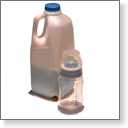| Food allergies in infants and children |

Allergy to cow's milk is particularly common in infants and young children. In addition to causing eczema, hives, and asthma, it can lead to colic and sleeplessness, and perhaps blood in the stool or poor growth. Infants are thought to be particularly susceptible to this allergic syndrome because their immune and digestive systems are immature. Milk allergy can develop within days to months of birth. Fortunately, most children outgrow cow's milk allergy by the age of 5 years old. It is important to let mothers who are breastfeeding know that, if they drink milk, the baby may be exposed to some of the milk proteins.
If your baby is on cows milk formula, your health care provider may suggest a change to soy formula or an elemental formula if possible. Elemental formulas are produced from processed proteins with supplements added (basically sugars and amino acids). There are few, if any, allergens within these materials.
Exclusive breastfeeding for at least 3 - 4 months may protect babies from developing wheezing and eczema for the first 2 years of life, especially if many people in the family have allergies and asthma. The protective effects later in life are not known. often Therefore, health experts often suggest that mothers feed their baby only breast milk for the first 3 - 4 months of life.
Delaying the introduction of solid foods until 6 months may or may not prevent food allergies. The American Academy of Pediatrics initially recommended you delay adding eggs to your child's diet until age 2, and peanuts, tree nuts, and fish until the child is 3 years old. However, these recommendations are being revised. It appears that infants with a low risk of developing allergies can have solid foods after 4 - 6 months of age. It is important to discuss individual feeding recommendations with your child's health care provider.
Read more about food allergies:
- How allergic reactions work
- Common food allergies
- Food allergy or food intolerance?
- Diagnosing food allergies
- Treating food allergies
- Controversial issues
Created by the National Institute of Allergy and Infectious Diseases. Modified and updated by A.D.A.M., Inc. Image copyright A.D.A.M., Inc.
References
Greer FR, Sicherer SH, Burks AQ, et al. Effects of Early Nutritional Interventions on the Development of Atopic Disease in Infants and Children: The Role of Maternal Dietary Restriction, Breastfeeding, Timing of Introduction of Complementary Foods, and Hydrolyzed Formulas. Pediatrics. Jan 1, 2008;121(1)183 -191.
Reviewed By: Paula J. Busse, MD, Assistant Professor of Medicine, Division of Clinical Immunology, Mount Sinai School of Medicine, New York, NY, Review provided by VeriMed Healthcare Network. Also reviewed by David Zieve, MD, MHA, Medical Director, A.D.A.M., Inc.
